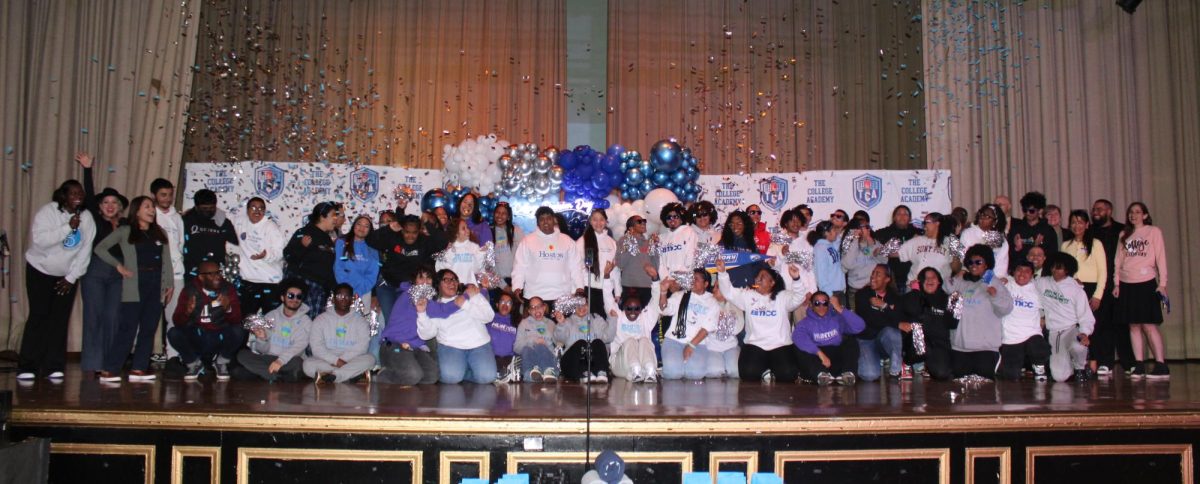Imagine you are a student in a classroom during a typical lesson. The classroom itself seems very average to the naked eye- there are students sitting down, a few of them chatting quietly, others paying attention to instruction. But, you are not a “normal” student, you are a student with autism spectrum disorder. For you the fluorescent lights are too bright and are giving you a migraine; you can hear the conversations all around you, clashing noisily with the teacher who’s speaking a mile a minute at the front of the room. You can hear the noises outside of the classroom, as the migraine is getting more and more intense by the second. The teacher’s words stopped being understandable minutes ago as the cacophony around you builds. At this point you are left confused, overstimulated, and too anxious and stressed out to learn anything.
This is what a typical day can be for a neurodivergent student. Many students hear the word “neurodivergent”, but very few of them actually know what it means. According to the official dictionary definition, neurodivergence is a divergence in the mental or neurological function of what is to be “typical”, or normal. This means that neurodivergence refers to individuals whose brain simply functions differently than others. (Those whose brains function “normally” are called neurotypicals.) In general, being neurodivergent will often refer to someone on the autism spectrum, but neurodivergence is a non-medical blanket term for many, many other disorders, such as ADHD, dyslexia, dyspraxia, OCD etc. Neurodivergence is often overlooked in both work and school settings, with it being chalked up to the individuals being “lazy” or plain “stupid”. (forbes.com)
However, these descriptors are not only ableist (which is discrimination in favour of able-bodied people), they’re also just incorrect. Being neurodivergent is often viewed as a negative thing, because having your brain wired in a different way than others could only possibly be a hindrance and make one have less ability. But, while neurodiverse people do struggle everyday in their life, they still have strengths that make them just as capable as neurotypicals, perhaps even more so.
According to the National Library of Medicine, it is thought that 20% of the population is to be neurodiverse in some way, shape, or form. While this may not seem like a lot, 20% of the population is approximately 1.6 billion people. According to 2020 data from the US Bureau of Labor Statistics, students with disabilities, whether they’re mental impairments or otherwise, are far less expected to be employed than those without. BLS data from 2022 states, “Across all age groups, persons with a disability were much less likely to be employed than those with no disability… The unemployment rate for persons with a disability was about twice as high as the rate for persons without a disability.” What this means is that persons with disabilities are still experiencing difficulties in the workfield. But, this isn’t the only place in which disabled people struggle- there is also the matter of school life.
School is a place that has been naturally tailored for neurotypical students. Neurotypical culture is simply wired into not only our schools, but into our society as a whole- and of course, this works completely against neurodiverse students. 20.6% of neurodiverse students are expected to ever get a bachelor’s degree, compared to the 40% of neurotypical students that are expected to get a bachelor’s degree. The vast majority of schools, both inside and outside of America, do not offer accommodations to students with disabilities, and if they do, it’s only tailored to a specific demographic of neurodiverse students. (aacu.org)
With all of this information in mind, it leads us to wonder, how specifically do neurodivergent students struggle in school? TCA junior and neurodivergent learner Keyana Stewart was asked about her experiences in school. Stewart then goes on to say she feels she struggles less outside of school, stating that she “can be who I want outside of school, without people judging me.” Stewart says that she only feels “a little” supported by the school, saying that the only thing they’ve done to support her was giving her an IEP to have additional time on assignments and exams. In terms of the mental components that come along with neurodivergence, Stewart said that she felt her biggest support within the school was social worker Daysi Pereira. When asked what the community needs to know about neurodivergence, Stewart responded with, “Neurodivergence, it isn’t only autism like some people think- it’s also ADHD, ADD, all those things…and it doesn’t necessarily make a person stupid, or unable to do stuff, it just makes it sometimes slightly harder.”
Stewart’s response reflects the student perspective of this matter, but to truly understand the depth of it, we must consider a teacher’s perspective. Thus, I interviewed special-education and ELA teacher, Kenia Marte to gain a further comprehension of the full situation. Ms. Marte is a new teacher, with her first year of teaching being in September of 2021. When asked if she believed schools were doing nearly enough for neurodiverse students, Marte expressed her opinion that no, they aren’t doing enough. She went on to delineate how the issue lies within the world’s view on neurodivergent people as a whole, stating that the world has adopted the mindset that if you can’t catch up with us, the neurotypicals, then you’re just going to fall behind. Marte then explains how it can also be a matter of funding- not just for TCA, but for many schools in varying districts. This perspective shows that the lack of support for these students isn’t the fault of the individual teachers and the common belief that they simply don’t want to help them, but in actuality, the matter is left out of their hands. “Sometimes, there’s more that you want to do for a student, and admin wants to support you in doing that, but they can’t because they’re working part of the same system.” Marte stated, before explaining that many believe that the principal or superintendent have the final say in these situations, when in reality, there is always a “higher entity to answer to”.
This tells us that the lack of support neurodiverse students feel can’t be solely attributed to the teachers, as there is much more going on behind the scenes within administration that many students aren’t aware of. Additionally, there is also the struggle teachers face when trying to offer support to neurodiverse students who are all too aware of the stigma around them. Marte expressed how neurotypical students, and people in general, have created a type of shame around being neurodiverse, leaving students who need additional support feeling too embarrassed to accept it, resulting in them denying the help and support they need to flourish not only academically, but emotionally and mentally. Students are so fearful of answering something incorrectly, or doing something that even slightly deviates from what the teacher or class may think, that they instead resort to not answering at all.
The key takeaway from the perspective provided by Marte is that supporting students, neurodiverse and not alike, goes beyond the surface. There are many factors to consider, and it is far more complex than simply offering support such as IEP, SLP, or counselling, or leaving it up to the student. It takes effort and funding, and we, as a society, are nowhere near being able to completely support and embrace neurodivergence into our school culture. The damage done from the stigma and stereotypes towards this marginalised group has been rooted so deep into our society that many people don’t even realise it’s bad, feeling what they’ve been told about neurodivergent people is simply correct. It’s this effect that sets us back, as these people tend to not take kindly to correcting them if they’re to call another student with autism or dyslexia “slow”, or calling them “stupid” for their disability.
Knowing all this, what is it that we can do to support neurodivergent students and people? Simply put, there is no one way to help all neurodivergent students. Each one of them are unique in their own ways, and each one will need separate support that works best for them specifically. However, there are some methods we as a society can begin integrating into our culture. The first one is as simple as it comes; talking to them. Oftentimes, neurodivergent students feel unsupported and struggle because teachers don’t speak to them and just ask what is it they can do to assist them in any way. Treat the neurodiverse as actual people and not as a hindrance or a burden. Consider the fact that neurodivergent people often have original ideas and solutions to problems, and offer a unique perspective to things that you may not have thought of on your own. We must embrace neurodivergence as a gift and a benefit to society.
If you’d like to read more on how you can support your neurodivergent peers, feel free to refer to the sources below;
Greatplacetowork.com
aacu.org
shecancode.io








